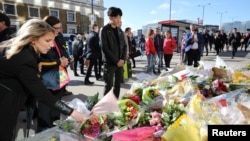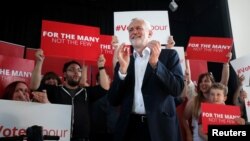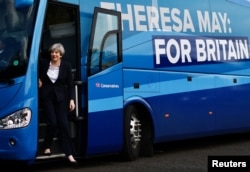After three Islamist attacks in Britain in as many months, many voters in the town of Corby say security is now their major concern for Thursday’s election — and they see both Prime Minister Theresa May and her Labour challenger as weak.
A once thriving steel town in central England, Corby has backed the winning party in every British general election since 1983, and if Labour is to upset opinion polls that point to victory for May’s Conservatives, this is the kind of parliamentary seat it needs to take.
The town overwhelmingly backed leaving the European Union in last year’s referendum, following a campaign when immigration became a central issue.
While Brexit negotiations have yet even to begin, a number of Corby residents told Reuters that national security has become their main worry since the militant attacks in London and Manchester, and some still link it to the immigration question.
Neither Corbyn nor May
Voters were unimpressed with Labour leader Jeremy Corbyn, a veteran, anti-war campaigner who the Conservatives have tried to paint as soft on fighting terrorism.
Corbyn has invited supporters of the Palestinian group Hamas to parliament, and advocated dialogue with Irish republicans who fought British forces in northern Ireland until the late 1990s, although he says he condemns political violence by all sides.
Local residents, however, have little time for May either, even though the Conservatives have traditionally portrayed themselves as the party of law and order.
‘Lesser of two evils’
“I am voting Conservative because I would never vote for Jeremy Corbyn, but May is also very weak on terrorism and is an indecisive leader without principles,” said Claire Soltzed, 61, who owns a boutique shop in the town’s shopping mall. “In no way am I a May supporter, but she is the lesser of two evils.”
The Corby parliamentary constituency has been hotly contested by the two main parties, changing hands five times since 1983. In 2015, the Conservatives won it by 2,412 votes and Labour has made it a top target this time round.
In worrying increasingly about national security, Corby residents appear broadly typical of voters across Britain. After Saturday’s attack in London in which eight people died, an Opinium poll showed 11 percent of respondents said anti-terrorism policy would influence their vote, up from just 2 percent last week.
Britain under attack
Once a destination for Scots who moved south to work in Corby’s huge steelworks, large numbers of eastern European immigrants from countries such as Poland, Romania and Bulgaria have arrived in the past decade.
The surrounding rural areas remain affluent, but the steelworks have closed, to be replaced by retail chains and indoor shopping centers. Corby’s main shopping street is now lined with discount stores.
The mix of immigration and the recent attacks now looms large for locals, although two of the three recent attacks were staged by British-born militants.
“I hate Corbyn, he is a terrorist sympathizer,” said taxi driver Phil Andrews, who voted for the anti-EU U.K. Independence Party in 2015 but will be backing the Conservatives this time.
“I voted for Brexit, I lived here for all my life and I think immigration is a big issue in this election. At one point Corby was called little Scotland, now it is called little Poland.”
Butcher Susan Short, in her 50s, said: “My main issue is terror, there are a lot of immigrants in the U.K. and I worry about more terrorism.”
Narrow lead for May
Since May called the snap election in April, her lead in the polls has narrowed from more than 20 percentage points to single figures, suggesting that instead of a landslide, she might even struggle to win an overall parliamentary majority.
May’s own ratings have fallen significantly too and her record on security has come in for criticism as police numbers were reduced every year under her watch as interior minister from 2010-2016.
“I do not like Theresa May. The last few weeks have shown how weak she is on terrorism,” said Mary Talbot, in her mid 50s, who works in a convenience store in Corby. “I did not think that it was a main issue until the last few weeks and now I am worried about my kids and about safety. May has cut police officers and made our country less secure.”
William Wagner, in his 40s, who did voluntary work in the town, said he was still undecided on his vote but he was not going to back the Conservatives.
“I hate Theresa May,” he said. “My main issue is terrorism. We need to stop it right away.”
May’s theme throughout the campaign has been that she would provide strong, stable leadership in contrast to Corbyn. Only last year he had to fend off a challenge to his leadership by lawmakers in his own party who thought he was not up to the job.
Anthony Smith, a 21-year-old a bar supervisor who supports Brexit, dismissed May’s pitch for power.
“She says one thing and then says something completely different. She’s making promises she can’t keep,” he said.
Samantha Turner, 55, works in a corner shop, was equally scathing of Corbyn.
“I am not voting Labour for the first time in a while,” she said. “Corbyn is weak and I do not trust him for the future of my kids. He will not make a good deal for Brexit.”








